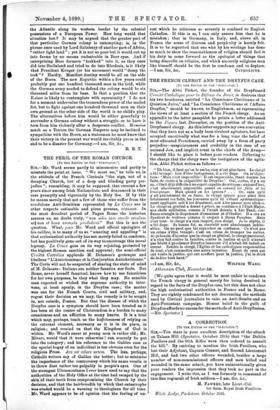THE PERIL OF THE ROMAN CHURCH.
[To THE EDITOR OF THE "SPECTATOR."] Sin,—Mr. Ward seems partly to misconceive and partly to misstate the point at issue. " We must see," he tells us, in the attitude of the French Clericals "the sign, not of a decaying Church, but of a deep and blinding party pre- judice"; resembling, it may be supposed, that current a few years since among Irish Nationalists, and denounced in their case promptly and vigorously by the Holy See. If by this he means merely that not a few of those who suffer from the scrofulous Anti-Semitism represented by La Croix are in other respects estimable and pious persons, transeat. In the most decadent period of Pagan Rome the historian assures us, no doubt truly, "non adeo tam sterile savulum sal non et bona exempla prodiderit." But this is not the question. What, pace Mr. Ward and official apologists of his calibre, is to many of us so "amazing and appalling" ie that ecclesiastical authority has not merely failed to condemn, but has positively gone out of its way to encourage this moral leprosy. La Croix goes on its way rejoicing, protected by the highest Roman sanction and approval; the semi-official Civiltd Cattolica applauds M. Delassua's grotesque and libellous "L'Americanisme et la Conjuration Antichretienne." The Curia will not be suspected of sharing the state of mind of M. Delassus : Italians are neither fanatics nor fools. But Rome, never herself fanatical, knows how to use fanaticism for her own purposes, be they what they may. No sensible man expected or wished the supreme authority to inter- vene, at least openly, in the Dreyfus case ; the matter was one for the French Courts, civil and military, and, regret their decision as we may, the remedy is to be sought in, not outside, France. But that the disease of which the Dreyfus case is a symptom should have been treated as it has been at the centre of Christendom is a burden to many consciences and an affliction to many hearts. It is a trial which may, perhaps, teach us the hopelessness of relying on the external element, necessary as it is in its place, in religion ; and remind us that the Kingdom of God is within. Mr. Ward's sneer at young men is rather old ; Mr. Mivart, would that it were otherwise ! can scarcely be put into the category ; and his reference to the Galileo case as the special bogey of an individual is too obvious even for the religious Press. Ars est celare artern. The less, perhaps, Catholic writers say of Galileo the better ; but to minimise the importance of the controversy which his name recalls is to throw dust rather too palpably in people's eyes. One of the strongest Ultramontanes I ever knew used to say that the authorities of the Holy Office at the time had escaped by the skin 'of their teeth from compromising the Church by their decision, and that the hairbreadth by which that catastrophe was evaded would be a warning to theologians for all time. Mr. Ward appears to be of opinion that the feeling of un-
rest which he criticises so severely is confined to English Catholics. If this is so, I can only assure him that be is mistaken ; that in Germany, in Italy, and, above all, in France the sense of distress and perplexity is keenly felt. It is to be .regretted that one who by his writings has done so much to show the reasonableness of religion should feel it his duty to come forward as the apologist of things that bring discredit on religion, and which sincerely religious men like himself should be the first to condemn and to deplore.






















































 Previous page
Previous page